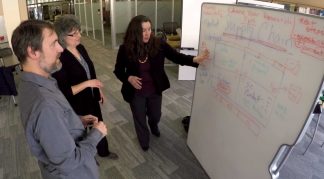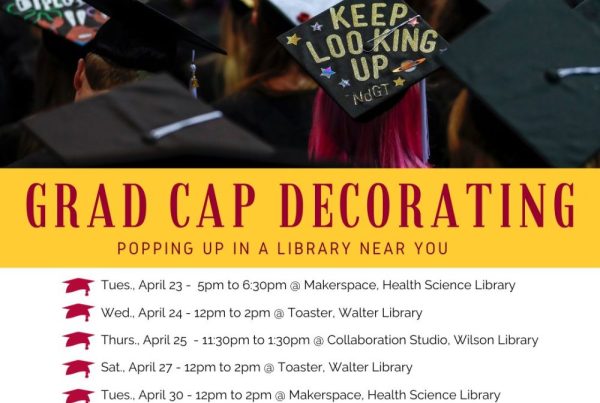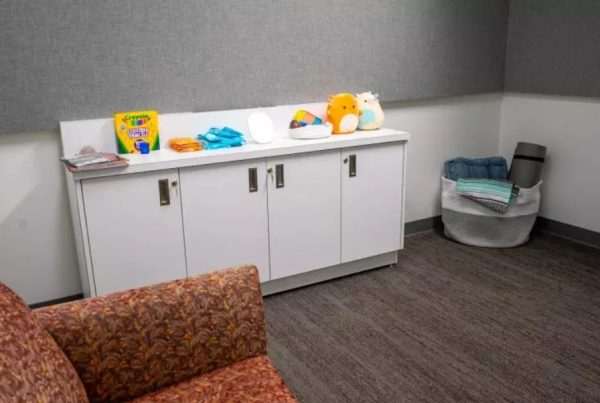
The Libraries’ Andrew Palahniuk and Mary Schoenborn with Kate Reigel (right) plan the components of a secondary research tool for the Reigel’s supply chain capstone students.
By Jon Jeffryes
Kate Reigel had an idea to improve student learning.
When the University of Minnesota Libraries announced its first set of Research Sprints in May 2017, Reigel seized the opportunity to partner with Libraries’ experts for a week of intensive work that would take that idea and turn it into a research resource to benefit students.
Reigel, Professional Director of the MS in Supply Chain Management Program at the Carlson School of Management (CSOM), works with graduate students who are working full-time in their profession as they earn their degree — many who have been out of academics for a decade or more. She saw that re-acclimating to the scholarly information environment took time away from already busy students.
“We have these incredible resources for secondary research, we have access to industry reports, we have access to articles, just a wealth of knowledge and resources waiting to be used,” Reigel said. “I had been wanting to create a resource to navigate these resources more easily.”
The Research Sprint
Research Sprints provide a series of days for faculty to partner with librarians to focus deeply on a project without distractions to produce a tangible product or outcome.
Reigel and her CSOM colleague Karen Donohue partnered with Business and Economics Librarians, Caroline Lilyard, Mary Schoenborn, and Jenny McBurney, the Libraries’ Instructional Design Team, Lindsay Matts-Benson and Andrew Palahniuk, and E-Learning Lead, Kristi Jensen.
The combination of strengths: deep-subject expertise, information literacy, pedagogical best practices and technological know-how, culminated in the creation of Research in Supply Chain Management — a guide for students in navigating the vast sea of valuable information available from the Libraries. The guide was tailored to the needs of students in Reigel’s capstone class, a real-world experiential project applying the skills they’d learned during the program.
The guide from concept to creation was completed in five days — by day three a prototype had been created, followed by user testing with graduate students on day four and finalized revisions on day five.
“Winnowing down content applicable to the supply chain management field and experiential learning projects — and then presenting it in a format familiar to CSOM students using their school’s website — allows the students to gather secondary data more quickly,” explained Caroline Lilyard, Business Librarian. “Harmonizing the content and desired structure took a lot of thought and discussion.”
The website facilitates interactions with librarians, it doesn’t replace them, Reigel said.
“The idea would be you use this tool to get past that first layer of research — you can find the more obvious levels yourself,” Reigel said, “and then you go to the librarian when you’re looking to get more depth of knowledge.”
The Benefit
Reigel saw an immediate impact in the ability of her students to engage more deeply with scholarly content, resulting in richer educational experiences in their experiential projects.
“I had one team who had done all of this research and they found an industry report that was just flat out wrong. They found and triangulated a fact base that could prove that this industry report had incorrect information,” Reigel said. “It was this moment of interaction with secondary research on a level I hadn’t seen before.”
And the secondary-research tool also allowed Reigel’s students to deliver fact-based recommendations and increased value to the Minnesota companies involved in the capstone projects.
Although originally designed with the supply chain students in mind the tool has wider application to any student wanting a more streamlined interaction with secondary business research.
‘I would love to work with them again’
Both librarian and faculty participants speak highly of the Research Sprint experience.
“It was a lot of fun to be able to use our expertise in a very targeted way, translate it through what the supply chain experts wanted, and use all of that combined expertise to help the capstone students with their real world projects.” Lilyard said.
“I highly recommend anybody who has an idea to work with the Libraries. I would love to work with them again. I’ll have to come up with a new idea so I have an excuse to — they were just wonderful,” Reigel added.




